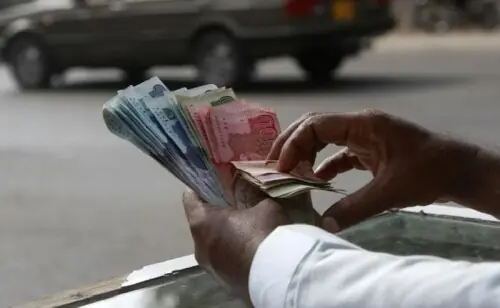WASIM Umar, a labourer, sits on a charpoy, placed on a road divider in the city of Jacobabad, Pakistan. This is where he sleeps at night. He does so because the passing vehicles blow gusts of air at him, offering the only respite from the heat. Children sleep in wet clothes at night and jump into agricultural wastewater in the day to cool off. Daily wage earners trade reduced wages for breaks their bodies compel them to take. Buying ice each day is a necessity for every household, often used to cool floors, when there isn’t even enough electricity to power a fan. Heatwaves have forced residents of one of the planet’s hottest cities to find desperate solutions as they face the adverse impact of climate change.
As recently documented in Amnesty International’s briefing Unliveable for Humans, Jacobabad reflects what happens when abject poverty meets climate change. Scalding heat and humidity levels have crossed the thresholds described by experts as “hotter than a human body can handle”. Combine that with frequent power outages, rampant deforestation and inadequate shelter, and a climate change nightmare is born.
For its part, Pakistan has been clear-headed about the impact of climate change. It has featured prominently in the country’s foreign policy, been described as a cornerstone of the current government’s vision, guided its media-savvy ‘Billion Tree Tsunami’ and taken centrestage at many a speech at international forums.
At COP26, this clear-headedness also gave way to wry honesty. It is hard to disagree with climate change adviser and minister Malik Amin Aslam that “throwing pennies into the Trevi Fountain” is not a remedy to the crisis. More charged still was his comment to the New York Times that most leaders won’t even be around by 2070 to see their commitments to net-zero emissions through.
Not everyone is being consulted on climate change.
Signing up to global pledges to reduce methane emissions, pledges to eliminate deforestation by 2030 and calling out leaders at COP26 for saying more and doing less, it is evident Pakistan is serious about climate change.
But just as pledges made at COP26 remain void without discernible just transitions, Pakistan too, must pave its way to changes we can see as clearly as the effects of climate change. The country’s overdue revised Nationally Determined Contributions (NDC) have finally been submitted to the UNFCCC, committing to cut 50 per cent of projected emissions below business-as-usual, and pledging to have 60pc of all energy produced to be renewable by 2030.
In his COP26 speech, Mr Aslam drew attention to the fact that Pakistan shelved three major imported coal power plant projects last year. That is a step to be emulated by other developing countries. However, tucked away in the NDC submission is that local coal will still be developed, increasing it to form 15pc of Pakistan’s energy resources. Quietly stated caveats to all lofty pledges were a running theme at COP26. Commendable promises are announced, only to be followed by an almost impossible condition for their fulfilment.
The fact is that while there are long-term benefits of Pakistan’s climate change response measures, like the protection of wetlands, expanding mangrove forest cover, electronic vehicular policy, and ‘green Eurobonds’, there is a lack of immediate assistance to groups that are already bearing the brunt of climate change, as demonstrated in Jacobabad. Renewable and reliable sources of energy are not readily available or accessible, especially to those living in poverty. Assistance to cope with extreme weather events remains elusive. Livelihoods that are particularly susceptible to climate change remain beholden to exploitative labour practices. More needs to be done, and soon, to put in place human rights-consistent climate-adaptation measures in the context of rising temperatures, extreme rainfall, melting glaciers and more frequent days of unbearable heat.
Read more: Climate change: A growth imperative in Pakistan
There is an urgent need for effective and human rights-consistent measures to support people to adapt to the effects of climate change and to reduce emissions, particularly by phasing out fossil fuels and protecting natural ecosystems. But the groups that need to be a part of the solution, like women, people living in poverty, farmers and fishermen are not being consulted. They are not participating in decisions involving their lives and steps are not being taken to remove obstacles that prevent them from doing so. While at COP26, Pakistan duly recognised the role of the youth movement to mobilise action against climate change, they must inform the climate response back home as well.
It is unlikely that Wasim Umar will know what happened at COP26. He won’t be able to track what pledges were made, which countries overpromised (all) and which countries underdelivered (all). But when he returns to the road at night, every single decision made in Glasgow could determine whether he sleeps that night.
The writer is the Pakistan campaigner for Amnesty International.
Published in Dawn, November 22nd, 2021




































